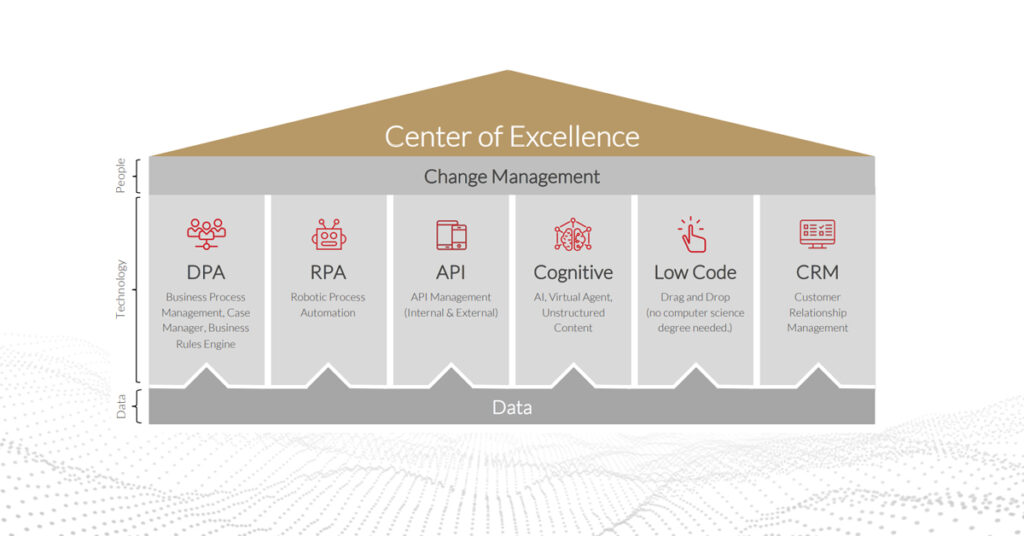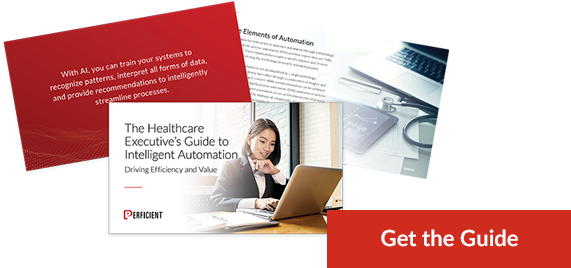Creating an AI or machine learning proof of concept is a relatively straightforward process. However, as multiple teams start creating their own models for similar tasks, it can lead to duplicative training and tuning efforts, resulting in different outcomes, predictions, and accuracy levels. The ultimate goal of automation is to consolidate these efforts into one model, streamlining the data curation, labeling, and definition processes.
Building a Center of Excellence
Data serves as the cornerstone of intelligent automation, where various technologies like DPA, RPA, and AI work together on the data. It’s crucial to have individuals overseeing the human aspects, such as change management during the adoption of intelligent automation.
To fully empower intelligent automation, it’s essential to consider the people involved in workflows, processes, and technologies derived from data.
Start by establishing purpose-driven architectures and utilizing each technology platform for its intended purpose. By creating scalable components and repeatable patterns across the enterprise, you can optimize your overall solution.

3 Tips for Success
- Enable holistic, enterprise-wide efficiencies: Establish purpose-driven architectures by leveraging technology platforms for their intended purposes. Focus on creating a center of excellence (CoE) that encompasses a holistic intelligent automation approach. This approach allows for the optimization of solutions and the creation of reusable components across the enterprise.
- Automate in phases, starting with reliable data: As automation introduces complexities, it’s crucial to monitor efficiency and compliance continuously. Identify a single source of truth for your data to assess automation opportunities effectively. Develop a roadmap and incorporate additional capabilities gradually to achieve ROI and sustainability.
- Ensure successful adoption: Communication with other teams is key to addressing concerns and fostering a sense of ownership. Treating automation as a shared service enhances successful adoption.
Rolling out automation in phases enables you to achieve ROI and create a more sustainable environment.
Enabling Your Organization for Automation
Automation plays a pivotal role in digital transformation, impacting nearly all business processes. Healthcare organizations are embracing automation to enhance consumer satisfaction, optimize employee focus on critical tasks, increase capacity, and improve efficiency.
- Increase consumer satisfaction and engagement
- Focus employee attention on other business-critical tasks rather than on repetitive ones
- Increase capacity
- Improve efficiency
While automation drives efficiencies, human involvement remains essential. As automation adoption grows, individuals will collaborate with technologies to enhance processes. Leaders must be open to innovation and invest in new technologies to ensure future success.
As technology evolves, task completion processes adapt. The introduction of new technology doesn’t eliminate human involvement but rather enhances it to make systems and processes more efficient.
For example, the introduction of ATMs didn’t make bank tellers obsolete but shifted their roles. ATMs streamlined certain transactions, leading to fewer tellers per branch. However, as bank branches expanded, more tellers were employed to meet regional needs.
Explore our new guide The Healthcare Executive’s Guide to Intelligent Automation to leverage leading automation technologies, insights, and governance in healthcare organizations.
- How automation drives efficiency and value in healthcare
- Key automation trends and drivers of adoption
- Core elements of a successful automation strategy
- Best practices and steps to get started
Why Perficient
We combine healthcare and automation expertise to help you build robust teams and optimize processes. Our experts analyze current workflows and suggest future enhancements for enhanced efficiency.
Collaborating with partners specializing in intelligent automation allows us to tailor solutions to your specific needs. From readiness assessments to implementation, we provide end-to-end services to streamline your automation journey.
We are recognized by Modern Healthcare as a key healthcare consulting leader and acknowledged as a “Contender” in The Forrester Wave™: Digital Process Automation Service Providers, Q3 2020 report.




